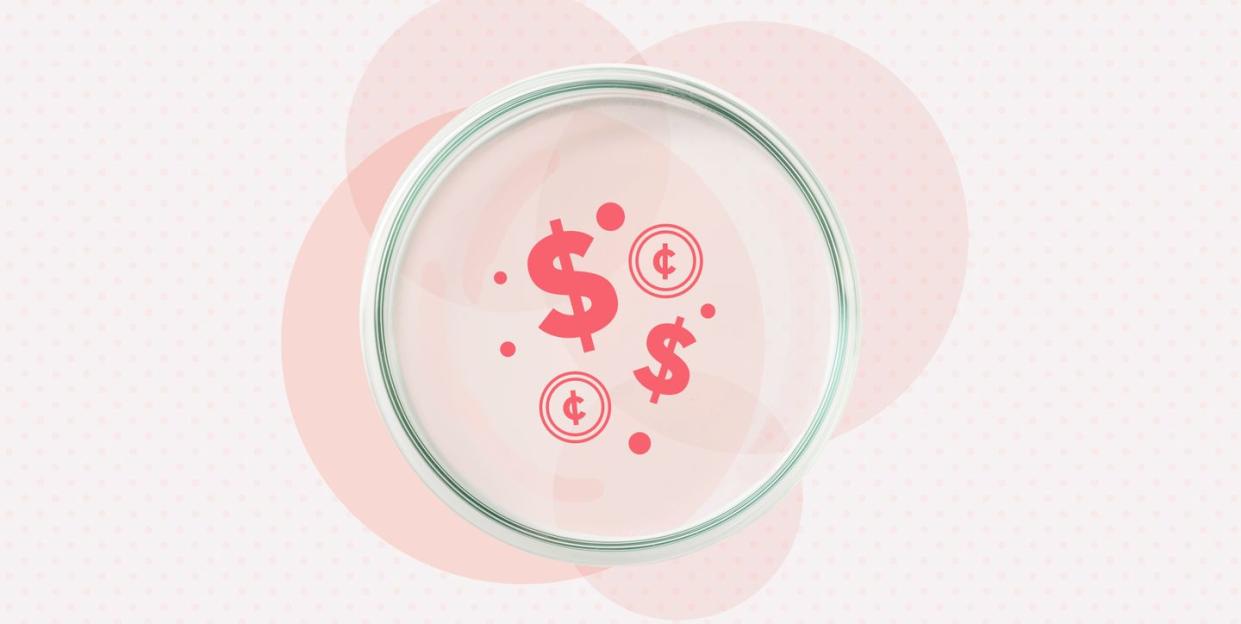If You're Considering IVF, Expect to Pay Thousands of Dollars

The question of the cost of in vitro fertilization is not a simple one. There are so many little factors that go into determining the cost, both from the patient (age, medical history, etc.), and from the procedural side (medications, monitoring, egg retrieval, and so on.). It all adds up. "The answers swing wildly when it comes to the price of in vitro fertilization," says Elyse Ash, founder and CEO of Fruitful Fertility, a fertility mentoring service.. "Mostly it depends on where you live, what types of procedures you're doing, which clinic you go to, and what kind of insurance you have."
Still, it's helpful to know what to expect before you start going down the IVF path so you can make a rough financial plan. Here are some of the costs to consider.
The cost of IVF depends on your personal history and your medical plans.
The types of procedures used, and hence the cost, vary from patient to patient. "Factors include patient age and past medical history, especially infertility history, which helps the doctor to determine what type of stimulation is best," says Dr. Alvin Gordon, M.D., the Chief Operating Officer of New Hope Fertility Center.
Once a patient history is taken, the medical team can determine if the best course of action is to do a conventional IVF, or if they qualify for something like New Hope's Natural Cycle IVF or Mini-IVF, which do not require as many fertility medications and are therefore less expensive.
There are other, personal choices that can affect the prices well. For example, "If the patient has low tolerance for pain and requires general anesthesia for the egg retrieval," Dr. Gordon says, "there's an additional cost for the anesthesiologist to administer the anesthesia."
When all is said and done, a plan is drawn up that includes monitoring, medication, egg retrieval, fertilization, caring for and storing the embryos, and possibly genetic testing, all of which come with their own price tags. According to the National Conference of State Legislatures (NCSL) which keeps track of state laws regarding fertility treatments, this all usually works out to somewhere between $12,000 to $17,000 per cycle of IVF. But again, this varies by state, by patient, and by procedure.
Dr. Gordon offers this as the approximate cost breakdown for in vitro fertilization:
Monitoring: $800
Egg Retrieval: $1,250
Fertilization: $1,500
Embryo Transfer $1,500
Medication cost: $200 to $2,000
Genetic testing: $750 per embryo
Freezing of the embryo during genetic testing: $1,250
Thawing of the embryo after genetic testing: $1,500
If there are more than 10 eggs, there will be additional charge of $500 (11–20 eggs), or $750 (more than 20 eggs).
Does insurance cover the cost of in vitro fertilization?
In many instances, insurance can cover all or part of the costs of IVF. You can check the NCSL website to see if there are laws governing whether or not insurance has to offer coverage. These laws also vary widely: New Jersey, for example, requires health insurers to provide coverage for the diagnosis and treatment of infertility (including in vitro fertilization), while Arkansas says its state's Comprehensive Health Insurance Pool cannot include coverage for any expense or charge for in vitro fertilization, artificial insemination, or any other "artificial" means used to cause pregnancy.
When dealing with insurance, it's wise to make sure you understand exactly what it will cover beforehand to prevent sticker-shock after the fact. That means asking them separately about the medications, retrievals, transferring, testing, and monitoring, because insurance may cover some but not all of these things. Also, some insurance companies state that a couple must prove that they've had infertility for a certain number of years before they cover IVF (according to state laws in Texas and Hawaii, a couple must show they've been dealing with infertility for five years).
Apart from insurance, couples can also apply for grants to cover IVF treatments or look for treatment centers that are grant-winners. "We're the recipient of an infertility grant from the Department of Health, which provides income-based assistance to patients who do not have insurance coverage," Dr. Gordon says.
This, of course, does not include the cost of missed work to perform the procedures, prenatal care, or the labor and delivery that happens after IVF is successful — costs that parents-to-be also have to plan for when creating a financial map to increasing their family.
You Might Also Like


